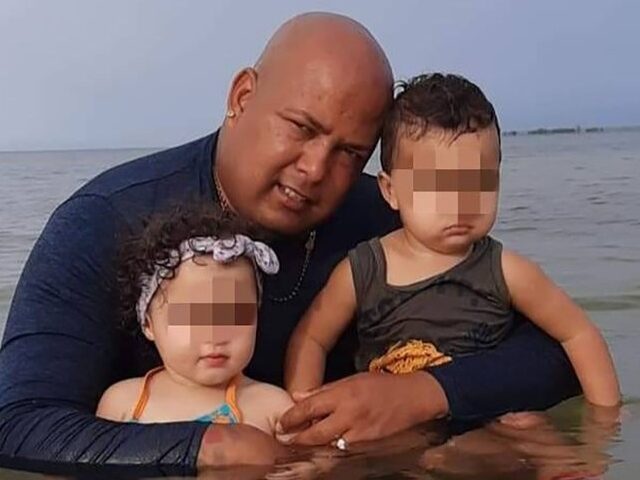The Cuban Observatory for Human Rights (OCDH), a watchdog group specializing in abuses on the island, revealed on Monday that dissident Daniel Joel Cárdenas Díaz will appeal his 15-year sentence for allegedly participating in the nationwide peaceful protests on July 11, 2021.
Cárdenas’s story became an international outrage after his wife recorded his arrest.
In the immediate aftermath of the July 11 protests – which prompted nearly 200,000 people in nearly every municipality in the country to take the streets demanding an end to communism – the Communist Party sent its special “black beret” repressive forces to conduct door-to-door raids looking for alleged protesters.
A report published last year by the independent outlet ADN Cuba revealed, with photographic evidence, that the Chinese People’s Armed Police (PAP), a paramilitary used to abuse dissidents in restive regions like Hong Kong and Tibet, trained Cuban “black berets” in tactics against civilians.
In Cárdenas’s case, police barrelled into his home, severely beat him, and shot him in the head in front of his two-year-old twins. Wife Marbelis Vázquez filmed the encounter, which occurred in northern Matanzas province, showing the toddlers sobbing and a pool of blood left in the aftermath of his arrest.
Warning – Graphic Images:
Vázquez has insisted in interviews with international media outlets that her husband did not engage in any violence on July 11 and that the charges against him are false. According to the OCDH, Cárdenas was sentenced to 15 years in prison for the crimes of “public disorder, propagating epidemics, sabotage, corruption of minors, and others.”
“Propagating epidemics” became a common “crime” used to prosecute July 11 protesters using the argument that the protests violated Chinese coronavirus social distancing protocols.
Prosecutors requested the 36-year-old serve a 35-year prison sentence, which the judge reduced to 15.
Prosecutors handed down the 15-year sentence in February, but Cárdenas decided to appeal the sentence this week, the OCDH revealed on Monday. The appeal will likely be based on the fact that Cárdenas denies engaging in any violence or looting on that day and that prosecutors reportedly did not present any evidence that he was present at the site of the alleged violence. Such a defense would not, however, absolve him of “propagating epidemics” by existing in public illegally.
At the time, in February, Vázquez revealed that the police raid had left her husband with severe injuries including a nearly five-inch bullet wound that Cuban authorities did not allow him to seek medical treatment for.
“They didn’t give him stitches because they said there was no thread,” Vázquez told the Spanish publication Diario de Cuba. “Of course, I imagine it was because this was about a protester.”
She also said Cárdenas experienced a severe bruise on his back, above his lungs, that made it difficult to sleep, but was never allowed to go to a hospital for medical care. Cuba’s healthcare system is notoriously dysfunctional, often killing otherwise healthy people it “cares” for.
Cárdenas’s wife said that the man was, indeed, present at a peaceful protest in Matanzas but did not engage in any looting or rioting.
Cárdenas is one of the thousands of Cubans arrested, often disappeared with no information provided to their families, in the aftermath of the July 11 protests. Castro regime agents began resurfacing the detained in mass trials late last year. The human rights group Cuban Prisoners Defenders revealed after the protests that Communist Party courts were conducting mass trials for as many as 30 people at once, often charged with vastly different alleged crimes and including accused individuals with special judicial needs, such as children and mentally disabled people. In one case in eastern Holguín city, 21 people ranging in age from 16 to 59 years old were processed for “sedition” in the same trial, all found guilty despite widely varying circumstances surrounding their arrest.
The intimidation and violence campaign has failed to quell protests against the 63-year-old communist regime on the island, which have occurred consistently throughout the year following July 11, 2021. Protests throughout the past month have focused on condemning the communists for failing to properly maintain the nation’s power grid, resulting in daily, sometimes all-day blackouts in impoverished communities while destinations for wealthy tourists in Havana operate without interruption. In July, a protest in far-west Pinar del Río attracted hundreds of people banging pots and pans and demanding electricity.
A month later, on the other side of the island in Camagüey province, a similar protest occurred demanding access to electricity. The Camagüey protest ended violently, with Cuban state security officials beating three 11-year-old girls in the process of beating one of their fathers unconscious and arresting him for peacefully protesting. The girls admitted in an interview smuggled out of the country that they attempted to attack the police officers to protect the girl’s father, to which police responded with blows.
“I was holding on to my dad, and she was holding on to my dad, and then, to arrest my dad, the police had to hit us,” 11-year-old Gerlin Torrente Echevarría explained. “I also hit them because they hit me.”
Cuban agents arrested the mothers of two of the girls last week but did not offer their relatives an explanation.
Follow Frances Martel on Facebook and Twitter.

COMMENTS
Please let us know if you're having issues with commenting.